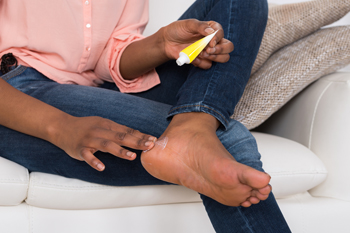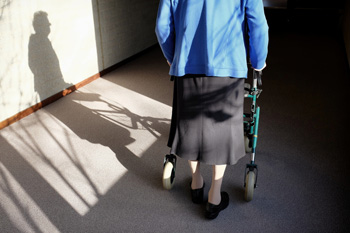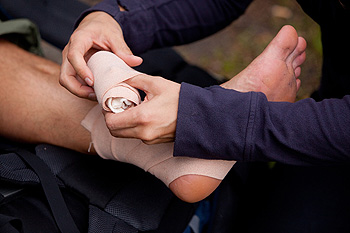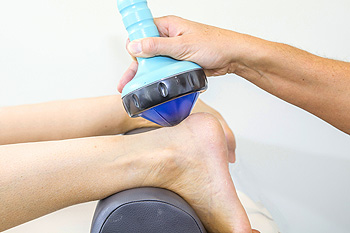Connect With Us
Blog
Items filtered by date: June 2021
How Long Does It Take to Recover From an Ankle Sprain
Ankle sprains occur when one or more of the ligaments in the ankle are overstretched or torn. This usually occurs due to a sudden injury or impact to the ankle. How long it takes to recover from an ankle sprain depends on the severity of the sprain and how closely you follow your doctor’s advice. A Grade 1 ankle sprain, which is considered mild, usually takes one to three weeks to recover. For a Grade 2 sprain, recovery time is a bit longer, at three to six weeks. A Grade 3 sprain, the most severe type, will take several months to fully heal. If you have sprained your ankle, it is suggested that you seek the care of a podiatrist.
Ankle sprains are common but need immediate attention. If you need your feet checked, contact David A. Edmonds, DPM from Advanced Podiatry Associates. Our doctor can provide the care you need to keep you pain-free and on your feet.
How Does an Ankle Sprain Occur?
Ankle sprains take place when the ligaments in your ankle are torn or stretched beyond their limits. There are multiple ways that the ankle can become injured, including twisting or rolling over onto your ankle, putting undue stress on it, or causing trauma to the ankle itself.
What Are the Symptoms?
- Mild to moderate bruising
- Limited mobility
- Swelling
- Discoloration of the skin (depending on severity)
Preventing a Sprain
- Wearing appropriate shoes for the occasion
- Stretching before exercises and sports
- Knowing your limits
Treatment of a Sprain
Treatment of a sprain depends on the severity. Many times, people are told to rest and remain off their feet completely, while others are given an air cast. If the sprain is very severe, surgery may be required.
If you have suffered an ankle sprain previously, you may want to consider additional support such as a brace and regular exercises to strengthen the ankle.
If you have any questions please feel free to contact our offices located in Northampton and Allentown, PA . We offer the newest diagnostic and treatment technologies for all your foot and ankle needs.
Treatments for Cracked Heels
Cracked he els, also known as heel fissures, occur when the skin on the heel splits or cracks. As it dries, the heel’s skin loses its strength and elasticity, and they become hard, dry, and flaky. Common causes of cracked heels include long periods of standing, poorly fitting shoes, dry and cold weather, or obesity. Patients who are struggling with dry and cracked heels should frequently apply moisturizer to the heels, avoid harsh soaps, avoid long harsh showers, use a pumice stone, or use a liquid bandage. However, in severe cases of cracked heels, the help of a podiatrist may be necessary. A podiatrist can help remove dead skin, prescribe stronger softening medications, prescribe antibiotics for infections, and recommend shoe inserts or heel pads. Therefore, if you are struggling with cracked heels don’t hesitate to visit a podiatrist for treatment recommendations!
els, also known as heel fissures, occur when the skin on the heel splits or cracks. As it dries, the heel’s skin loses its strength and elasticity, and they become hard, dry, and flaky. Common causes of cracked heels include long periods of standing, poorly fitting shoes, dry and cold weather, or obesity. Patients who are struggling with dry and cracked heels should frequently apply moisturizer to the heels, avoid harsh soaps, avoid long harsh showers, use a pumice stone, or use a liquid bandage. However, in severe cases of cracked heels, the help of a podiatrist may be necessary. A podiatrist can help remove dead skin, prescribe stronger softening medications, prescribe antibiotics for infections, and recommend shoe inserts or heel pads. Therefore, if you are struggling with cracked heels don’t hesitate to visit a podiatrist for treatment recommendations!
Cracked heels are unsightly and can cause further damage to your shoes and feet. If you have any concerns, contact David A. Edmonds, DPM from Advanced Podiatry Associates. Our doctor can provide the care you need to keep you pain-free and on your feet.
Cracked Heels
Cracked heels appear unappealing and can make it harder for you walk around in sandals. Aside from looking unpleasant, cracked heels can also tear stockings, socks, and wear out your shoes. There are several methods to help restore a cracked heel and prevent further damage.
How Do You Get Them?
Dry skin is the number one culprit in creating cracked heels. Many athletes, walkers, joggers, and even swimmers suffer from cracked heels. Age and skin oil production play a role to getting cracked heels as well.
Promote Healing
Over the counter medicines can help, especially for those that need instant relief or who suffer from chronic dry feet.
Wear Socks – Wearing socks with medicated creams helps lock in moisture.
Moisturizers – Applying both day and night will help alleviate dryness which causes cracking.
Pumice Stones – These exfoliate and remove dead skin, which allows for smoother moisturizer application and better absorption into the skin.
Change in Diet
Eating healthy with a well-balanced diet will give the skin a fresh and radiant look. Your body responds to the kinds of food you ingest. Omega-3 fatty acids and zinc supplements can also revitalize skin tissue.
Most importantly, seek professional help if unsure how to proceed in treating cracked heels. A podiatrist will help you with any questions or information needed.
If you have any questions, please feel free to contact our offices located in Northampton and Allentown, PA . We offer the newest diagnostic and treatment technologies for all your foot care needs.
Plantar Warts Can Be Treated!
Caring for Aging Feet
 As the feet age, they begin to experience more wear and tear. The joints in the feet become stressed, and the skin becomes thinner and less elastic. Signs of aging feet include aches and pains, development of bunions, circulatory issues and the toes beginning to curl up. Because foot issues can be debilitating, older patients should take care of their feet. Common things that can be done to help reduce the effects of aging include exercise, general foot care (proper toenail trimming, checking for problems to detect them early, and moisturizing the feet), and wearing properly fitting shoes. Another key to help with aging feet is having an annual check with a podiatrist. Visiting a podiatrist can help find issues such as diabetes or poor circulation, and podiatrists can help treat common foot problems like bunions, ingrown toenails, and cracked heels.
As the feet age, they begin to experience more wear and tear. The joints in the feet become stressed, and the skin becomes thinner and less elastic. Signs of aging feet include aches and pains, development of bunions, circulatory issues and the toes beginning to curl up. Because foot issues can be debilitating, older patients should take care of their feet. Common things that can be done to help reduce the effects of aging include exercise, general foot care (proper toenail trimming, checking for problems to detect them early, and moisturizing the feet), and wearing properly fitting shoes. Another key to help with aging feet is having an annual check with a podiatrist. Visiting a podiatrist can help find issues such as diabetes or poor circulation, and podiatrists can help treat common foot problems like bunions, ingrown toenails, and cracked heels.
Proper foot care is something many older adults forget to consider. If you have any concerns about your feet and ankles, contact David A. Edmonds, DPM from Advanced Podiatry Associates. Our doctor can provide the care you need to keep you pain-free and on your feet.
The Elderly and Their Feet
As we age we start to notice many changes in our body, but the elder population may not notice them right away. Medical conditions may prevent the elderly to take notice of their foot health right away. Poor vision is a lead contributor to not taking action for the elderly.
Common Conditions
- Neuropathy – can reduce feeling in the feet and can hide many life-threatening medical conditions.
- Reduced flexibility – prevents the ability of proper toenail trimming, and foot cleaning. If left untreated, it may lead to further medical issues.
- Foot sores – amongst the older population can be serious before they are discovered. Some of the problematic conditions they may face are:
- Gouging toenails affecting nearby toe
- Shoes that don’t fit properly
- Pressure sores
- Loss of circulation in legs & feet
- Edema & swelling of feet and ankles
Susceptible Infections
Diabetes and poor circulation can cause general loss of sensitivity over the years, turning a simple cut into a serious issue.
If you have any questions please feel free to contact our offices located in Northampton and Allentown, PA . We offer the newest diagnostic and treatment technologies for all your foot and ankle needs.
A Non-Surgical Treatment Option for Chronic Foot and Ankle Pain
Extracorporeal Shock Wave Therapy (ESWT) is a non-invasive treatment that pulses high-energy sound waves through a hand-held device onto the site of pain, which permeate into underlying damaged tissue to reduce pain, stimulate tissue growth, and accelerate the healing process. ESWT has been used to treat foot and ankle conditions such as plantar fasciitis, Achilles tendonitis, and more. Since ESWT is a treatment that is administered outside of the body (extra corporeally), it is an alternative to surgery which may offer pain relief and faster healing along with a shorter recovery time. Individuals who are pregnant, have a pacemaker, take certain medications, or have medical conditions such as neuropathy are not good candidates for ESWT. If you have chronic pain in your foot or ankle that has not responded to other treatments, it is suggested you contact a podiatrist who will perform an examination and determine if ESWT is an option for you.
Shockwave therapy is a treatment commonly used to treat various injuries and conditions, particularly plantar fasciitis in the feet. To learn more, consult with David A. Edmonds, DPM from Advanced Podiatry Associates. Our doctor can provide the care you need to keep you pain-free and on your feet.
Shockwave Therapy
Shockwave therapy is a new treatment option designed to treat bone conditions such as tennis elbow, shoulder pain, and others. Shockwave therapy uses high intensity sound waves that are directed to the affected tissues of the body with pinpoint accuracy. The effects are very beneficial, leading to a production of collagen fibers, eliminating inflammation.
Who Benefits from Shockwave?
Shockwave is recommended for patients suffering from heel pain and associated problems. Heel pain is a common condition which can be caused by obesity, overexertion, and spending a substantial amount of time on hard floors with your feet exposed and unsupported.
Fast and Easy
The therapy is actually a simple process that can leave patients feeling better the very next day. Shockwave therapy is not as dramatic as it sounds. It enables more blood flow to effected areas, addressing the source of the problem and allowing treatment to last for a long time.
Treatment & Recovery Time
Shockwave treatment will enable your feet to recover quickly. This is especially important since surgery is not required. It is cost effective and does not require the use of anesthesia. This treatment is a better option to surgery, since it is proven safe.
If you have any questions, please feel free to contact our offices located in Northampton and Allentown, PA . We offer the newest diagnostic and treatment technologies for all your foot and ankle needs.



